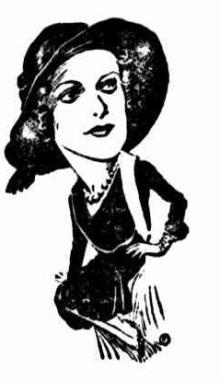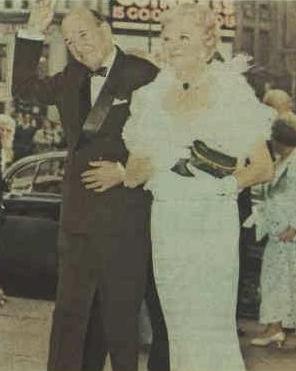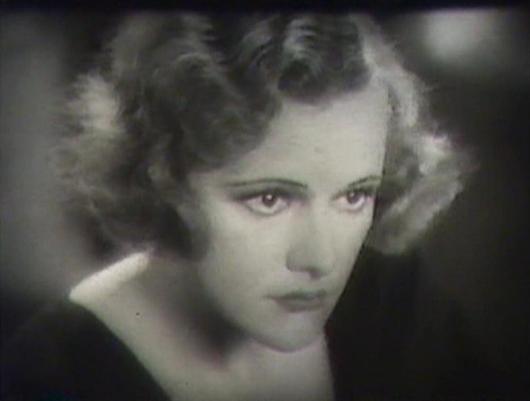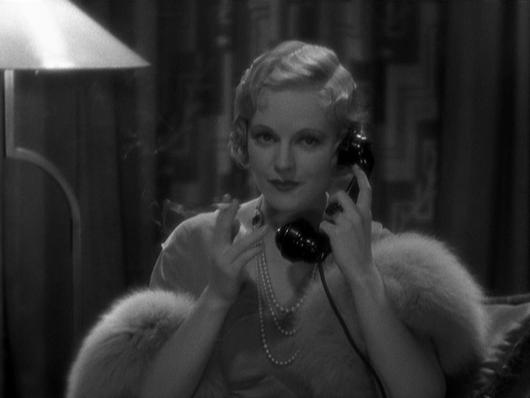Adrianne Allen was born in Manchester, England, February 7, 1907. The actress is most famed for originating the role of Sibyl in Noel Coward’s original stage production of Private Lives on London’s West End in 1930, but also appeared in a handful of films throughout her 32 year career as an active actress.
Allen was trained for her craft at the Royal Academy of Dramatic Arts where her graduation performance in 1926 caught the attention of Basil Dean. Dean had her cast in Coward’s Easy Virtue when it arrived in London from Broadway.
If the color image to the right is any hint, and it was published in 1968, Adrianne Allen remained friends with Noel Coward throughout their lives. Tony Aldgate writes that Coward dubbed Adrianne “Planny Annie” in tribute to her skills as master society hostess (258).She married the actor Raymond Massey in 1929. This union only last just shy of ten years but was certainly fruitful! She and Massey had two children, each of whom became very successful actors.
Daniel Massey (1933-1998) was an Oscar nominee and Golden Globe winner as Best Supporting Actor in Star! (1968) and younger sister Anna Massey (1937-2011) was a BAFTA Award winning actress with prominent roles in films such as Michael Powell’s Peeping Tom (1960) and Alfred Hitchcock’s Frenzy (1972).
Poor Adrianne Allen is certainly the least remembered of this nuclear family!
Her success in Private Lives, also starring Gertrude Lawrence, Laurence Olivier and Coward himself, was followed by the beginning of Allen’s film career. She was acclaimed over more established stars Edna Best and Owen Nares in Loose Ends (1930), also starring Miles Mander. As with Coward on the stage Allen would have a successful professional relationship with Mander in the world of film.
In her native Britain Adrianne Allen also appeared on screen opposite Colin Clive in The Stronger Sex; with Nares again in Mander’s The Woman Decides; and in Black Coffee, alongside site favorite Elizabeth Allan.
Adrianne Allen next came to the United States to make her Broadway debut in Cynara at the Morosco Theatre in 1931.
 Then the talkies came calling. Paramount signed her for what was reported as an £800 per week contract (Aldgate 220). It led to roles in two very strong movies.
Then the talkies came calling. Paramount signed her for what was reported as an £800 per week contract (Aldgate 220). It led to roles in two very strong movies.
Adrianne Allen appeared in but a dozen films during her lengthy career. Those early few back home and then a run of a few more back in Britain in the late 1940s and ‘50s. I know her from her Paramount pair.
Allen plays very different roles in Merrily We Go to Hell and The Night of June 13th (both 1932). They actually complement each other well working towards displaying the full spectrum of her talents.
In Merrily We Go to Hell she’s Claire Hempstead, the actress who stars in Jerry’s (Fredric March) latest play. And his old flame. She pushes Jerry back towards alcohol in hopes of winning him back from his wife (Sylvia Sidney), but really doesn’t see the playwright as anything more than her plaything. She’s very cold in this part.
She’s not nearly as composed in The Night of June 13th which finds her playing Clive Brook’s wife in Paramount’s big attempt to bring the success of their previous Street Scene (1931) to suburbia.
Allen’s Elna Curry is recovering from a breakdown and has become absolutely obsessed with the idea that her husband, John (Brook), is having an affair with neighbor girl Trudie Morrow (Lila Lee). While I found Allen went a bit too far with her hysterics she was nonetheless very convincing as the tortured Elna.
After that pair of films it was back to the stage for Allen who returned to London for Never Come Back in 1932 and was back on Broadway in The Shining Hour by 1934. Her New York Times obituary remarks on her scoring big as Elizabeth Bennett in 1935’s Pride and Prejudice at the Music Box on Broadway. Later that year she pops up back home again for old pal Mander in the Real Art movie The Morals of Marcus (1935) starring Lupe Velez and Ian Hunter.
And remember, this was also the decade which saw her give birth twice! It must have been a hectic and exciting time in her life.

Adrianne Allen and Fredric March watch as Sylvia Sidney gets ready to descend in MERRILY WE GO TO HELL
Allen and Massey divorced in 1939. Controversy followed.
I don’t know if I could imagine 1939 producing a more scandalous headline than this: “Actor Massey, Attorney Complete Wife Swap,” but that’s just how The Capital Times of Madison, WI announced the news.
 The attorney of the headline was the well known William Dwight Whitney, who had divorced his wife, Dorothy, on July 15, 1937.
The attorney of the headline was the well known William Dwight Whitney, who had divorced his wife, Dorothy, on July 15, 1937.
A couple of years passed, but then things moved fast! Raymond Massey and Adrianne Allen divorced July 5, 1939. Massey married the former Mrs. Dorothy Whitney on July 9; Adrianne Allen married William Dwight Whitney on July 20, to complete the complicated swap.
What the salacious headlines of ‘39 could not predict was the enduring all around success of the realignment.
Each of the new unions lasted until the death of one partner with Allen widowing Whitney over 30 years later in 1973 and the Masseys remaining together even a decade longer until Dorothy’s 1982 death. Raymond Massey died just over a year later.
Meanwhile Adrianne Allen continued to enjoy success on both sides of the Atlantic. Replacing Peggy Ashcroft as the wife and mother in Edward, My Son on Broadway it was remarked that Allen enjoyed “one of that year’s big moments on Broadway” (Pace) in a scene where she is bullied by her husband (Dennis King) on stage.
 Back in Britain she returned to films in supporting roles beginning with Roy Ward Baker’s popular film noir The October Man (1947) starring John Mills and Joan Greenwood. She continued in support in Bond Street (1948) and Vote for Huggett (1949) and, a little later, in Anthony Asquith’s The Final Test (1954), a title about the last match of a cricket player that has acquired several intriguing IMDb comments.
Back in Britain she returned to films in supporting roles beginning with Roy Ward Baker’s popular film noir The October Man (1947) starring John Mills and Joan Greenwood. She continued in support in Bond Street (1948) and Vote for Huggett (1949) and, a little later, in Anthony Asquith’s The Final Test (1954), a title about the last match of a cricket player that has acquired several intriguing IMDb comments.
Allen returned to Broadway in 1957 to star alongside daughter Anna in The Reluctant Debutante before retiring from the profession in 1958.
Husband Whitney died in 1973 but Adrianne Allen survived him by another two decades until cancer and other illnesses claimed her life September 14, 1993 in Montreux, Switzerland. She reportedly lived just outside of Montreux at the time of her passing.
As always the stage work is consigned to memory. A shame since it was Adrianne Allen’s association with Noel Coward that led to her greatest fame. The glowing feedback only survives in period sources. Modern rehashes do little more than make mention of Adrianne Allen. But her film work keeps Adrianne Allen alive.
Watch her come between Fredric March and Sylvia Sidney in Merrily We Go to Hell courtesy of Universal’s Pre-Code Hollywood Collection
. You’ll have to be more creative to see Allan’s breakdown in The Night of June 13th, but it is a superior film worth seeking out. You can also catch Adrianne Allen in her supporting role in The October Man courtesy of Netflix Instant at this time.
Sources
- ”Actor Massey, Attorney Complete Wife Swap.” The Capitol Times 21 Jul 1939: 6. NewspaperArchive. Web. 6 Feb 2013.
- Pace, Eric. “Adrianne Allen, 86, A British Specialist in Light Comedies.” New York Times 20 Sep 1993. New York Times Archives. Web. 6 Feb 2013.
- Aldgate, Tony. “Loose Ends, Hidden Gems and the Moment of ‘Melodramatic Emotionality.’” The Unknown 1930s: An Alternative History of the British Cinema, 1929- 1939
. Ed. Jeffrey Richards. London: I.B. Tauris, 1998. 219-237, 258.
[phpbaysidebar title=”Adrianne Allen on eBay” keywords=”Adrianne Allen,Adrienne Allen” num=”5″ siteid=”1″ category=”45100″ sort=”EndTimeSoonest” minprice=”29″ maxprice=”499″ id=”2″]








Leave a Reply